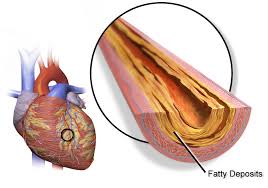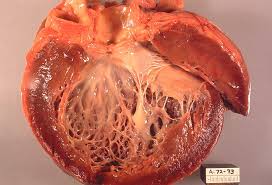
Diabetic heart disease (DHD) refers to the class of heart diseases that typically develop in people who have diabetes. Diabetes is a major risk factor for heart disease, mainly because of the way it affects blood flow. Read on to learn more:
1. Coronary Heart Disease

Coronary heart disease occurs when your coronary arteries (the arteries that carry oxygenated blood to the heart from the lungs) become narrowed, due to the gradual build-up of fatty materials with the artery walls. This reduces the flow of blood to the heart. The build-up of these fatty materials (made up of fat, cholesterol, calcium and other substances found in the blood) can often lead to the forming of blood clots in the arteries, which might partially or completely block blood flow.
Coronary heart disease (CHD) can often lead to a condition called angina, which involves severe chest pain and discomfort. It can also lead to arrhythmias (irregular heartbeats), heart attack and possibly death. Most times people don’t realize that they have CHD, until it eventually leads to a heart attack. This is why it is important to visit a doctor immediately you experience any slight pain in your chest.
2. Heart Failure

Heart failure refers to the inability of the heart to be able to meet up with the demands placed on it by the body. When this happens, the heart is unable to supply blood to other organs like the brain, liver and kidneys, which might lead to further complications.
This is a serious medical condition that requires urgent medical attention. 67 percent of heart failures often lead to death eventually, however, if this condition is diagnosed early enough and treatment starts immediately, then it can be managed effectively. So visit your doctor if you’ve noticed symptoms such as shortness of breath, fatigue and swelling in the ankles or feet.
3. Diabetic Cardiomyopathy

Diabetic cardiomyopathy is a disorder of the heart muscles which occurs in people with diabetes. It damages the structure and function of the heart. This disease has the ability to cause heart failure and could also lead to a condition called edema. Some symptoms of this condition might include general body weakness, shortness of breath, swelling of the legs and feet, and severe coughing.
Conclusion
Due to the effects of diabetes on nerves (nerve damage), most people who have diabetic heart disease may not notice any signs or symptoms. This is often regarded as silent heart disease. So it is important that people who have diabetes should regularly visit their doctor for checkups because early treatment can help a great deal.
WhatsApp number: +971565830067 (Just send us code 6163 and we will get back to you ASAP)
Contact Us: Click here to send us your details or fill in the form below.
You can get in touch with us 24/7 and one of our experts will not only give you a free consultation but also help you pick out an appropriate male or female personal trainer to meet your needs. One-on-one personal training lessons are available in Dubai, Abu Dhabi, Sharjah, Ajman and RAK.